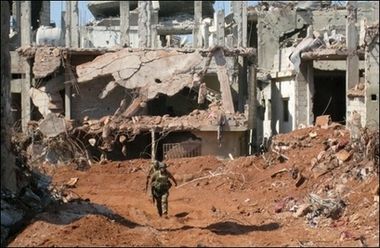 Sylvie Groult, AFP, August 17, 2007, NAHR AL BARED, Lebanon — Three months into the deadly standoff between the Lebanese army and Islamist guerrillas holed up in a refugee camp, troops are still battling to crush an unexpectedly well-armed and well-organized enemy. Located along the Mediterranean coast near the northern city of Tripoli, the Nahr Al Bared camp, today, is but an apocalyptic scene of twisted steel and ruins. The red-and-white Lebanese flag flutters here and there as a sign of the army’s advance.
Sylvie Groult, AFP, August 17, 2007, NAHR AL BARED, Lebanon — Three months into the deadly standoff between the Lebanese army and Islamist guerrillas holed up in a refugee camp, troops are still battling to crush an unexpectedly well-armed and well-organized enemy. Located along the Mediterranean coast near the northern city of Tripoli, the Nahr Al Bared camp, today, is but an apocalyptic scene of twisted steel and ruins. The red-and-white Lebanese flag flutters here and there as a sign of the army’s advance.
Black-and-white smoke hangs over the skeletal buildings that heave at the impact of each mortar round, or from the explosion of mines spread by the Fatah Al Islam fighters all over the sprawling camp. The army, in the last week, has resorted to air attacks in a bid to flush out the estimated 70 militants thought to be still hiding in subterranean shelters, along with some 100 women and children.
"We are using airstrikes, as shelling them with tank fire is no longer effective or sufficient," said an army spokesman. "We are trying to clear the small area around where the Islamists are holed up, so that our tanks and military equipment can get through." The drawn-out battle, which has claimed the lives of more than 200 people, including 136 soldiers, has taken even the war-hardened Lebanese by surprise.
Defense minister Elias Murr mistakenly announced an end to the fighting at the end of June, but has, since, kept a low profile, refusing to make a prognosis as to when the standoff may end. On the battle front, troops continue to slowly clear the camp’s sinuous streets of booby-traps and mines, as they try to seize the last, tiny area still controlled by the Islamists. The camp’s 31,000 Palestinian refugees fled at the start of the fighting May 20, leaving behind the Al Qaeda-inspired militants who infiltrated into Lebanon and took up positions inside Nahr Al Bared last year.
The radical Sunni Muslim radical group has Palestinian, Lebanese, and other foreign fighters within its ranks, including some from Iraq. On Monday, the United States designated Fatah Al Islam a "terrorist" group.
"This is a well-trained organization with sophisticated weapons, including heavy weapons, and they are used to handle explosives," Lebanese army commander in chief General Michel Sleiman said.
Analysts say the fighting has lasted so long for a number of reasons, including an ill-equipped and ill-trained Lebanese army, which is engaged in its first battle since the end of the country’s 15-year civil war in 1990.
The government has also struggled to limit the number of civilian casualties inside Nahr Al Bared.
"This army has not been engaged in battle for 15 years, is not well-trained, and is not equipped for this sort of fighting," said Elias Hanna, a retired army general and military analyst.
"The soldiers are faced with an experienced and well-prepared enemy that is willing to die," he added.
Analysts say the battle has also lasted so long as it is taking place amid a drawn-out political crisis that has created a power vacuum, with the government unable to address critical issues.
"The lack of political consensus is an obstacle, as, usually, in a democracy, the army carries out government policies," Hanna said.
About the only positive note from the battle is the unanimous support the army has enjoyed from Lebanon’s divided political and religious factions.
The fighting has also taken on political overtones, with army chief Sleiman considered a potential candidate in an upcoming presidential election.
"Without saying as much, he has announced his candidacy and, in doing so, he is saying: ‘The army chief, today, is the only person capable of leading the country to peace,’" said Ghassan Al Azzi, a political science professor at Lebanese University.



